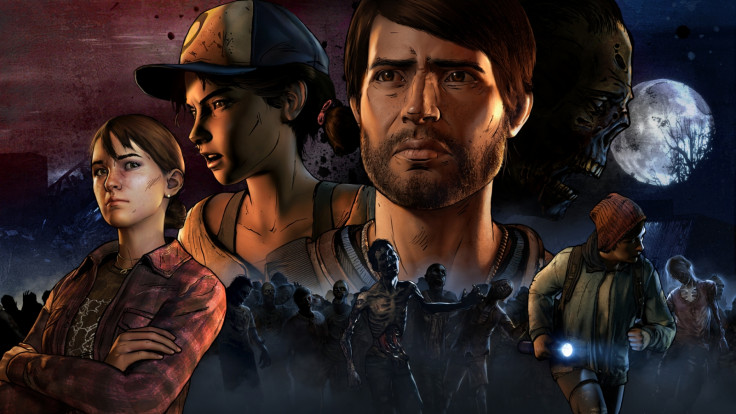Telltale's The Walking Dead season 3 is warding off the fatigue suffered by the TV show
By wearing its heart on its sleeve, Telltale's Walking Dead is starting to better its television cousin.

It hasn't been running as long, so what will become of it remains to be seen, but so far Telltale's The Walking Dead game has managed to stave off the creative fatigue that has beset its accompanying TV show.
Judging by its two-part opening episode, this third season – called A New Frontier – benefits from a dramatic change in tone.
It's still bleak, it's still melodramatic, but the increased bloodshed, the synthesizer score and the introduction of a character who kills zombies with a kung-fu style high kick re-frame The Walking Dead as fun, exploitative pulp horror.
Characters still have their moments, but Andrew Lincoln's RADA-cultivated glower looks all the more preposterous, and tiresome, by comparison.
On television, The Walking Dead has started to suffocate on the smell of its own self-importance. Incentivised presumably by the out of all proportion critical response to its earliest seasons, The Walking Dead has become a prestige production, determined, with each successive episode, to prove its dramatic integrity.
In short, it just isn't fun anymore. It's careful. It's pretentious. Even its supposedly shocking moments are exact, and purposefully designed to send waves through social media.
The Walking Dead has been a pop culture fixture for six-plus years, so the fact Telltale Games has written with any brio whatsoever is admirable. Dialogue in A New Frontier is artificial and crude – absolutely no-one, in any situation, speaks like this - but its emotional openness, when compared to the often-stilted stories in other 18-rated video games, makes the new Walking Dead, if not original, at least amusing.
Everything is big. Everything is sudden. Everything is tragic. Where the television show is miserable and violent ad infinitum, Telltale's latest season in particular appeals wantonly to a range of emotions. There are sudden deaths, love triangles, pregnancy scares, family fallouts – Telltale's The Walking Dead has become a soap opera, and thank God, because the comics, the show and, towards its end, the game's second season, had become so dreary.
Making Clementine a secondary character is a smart move not dissimilar to the decision to replace Snake with Raiden in Metal Gear Solid 2: Sons of Liberty. Without access to her internal process, we are left to judge her here on her actions. We regard her from a distance, the product of our decisions in seasons one and two, and are provided a different perspective entirely.
The Walking Dead is notorious for manipulating its audiences' emotions, but rarely gracefully – when the show wants a reaction, it takes a beloved character and caves in his head with a baseball bat. The ebb and flow of our closeness to Clementine however, over these past two series has produced a subtly intriguing character. There have been hokey and garish moments, but Clementine's situation in New Frontier is a lot more difficult to describe than Rick Grimes' in series six of AMC's TV show. Given a few more seasons, the dynamic might become tiresome, but for now, Telltale still has the freshest feeling Walking Dead story out there – and there are many.
To that end, Javier, the game's new central character, is instrumental. Where Lee Everett was a prototypical loner with a chequered past and Clementine was constantly put through the ringer, so Telltale could display just how near the knuckle it was prepared to go, Javier has more to bang than a single drum. At times, he feels like a drip. The supporting characters espouse their emotions and Javier just goes along: if Clementine is angry, he'll get angry, too. But such emotional availability and malleability make Javier a suitable guide for Walking Dead players.
Danny Ramirez, who plays Javier, could use a little more energy. The definitive lead performance in a melodrama belongs to Al Pacino in Heat, who is so wildly emotive that he ingratiates to the audience, in every scene, precisely how to feel. But Javier is nevertheless an open book, and when The Walking Dead TV show has prided itself for so long on ambiguous, grunting, wizened characters, such willingness to feel – even if it occasionally leads to mawkishness dialogue – is a breath of fresh air.
Throughout this superhero/comic book era, popular films and TV shows have become jaded and smug. Irony has replaced emotion. Suspension of disbelief has been superseded by post-modern nods to the audience. They make viewers feel aloof, and proud for not being "fooled" by fiction and entertainment, but these are fleeting pleasures. Buying the ticket and taking the ride is much more enjoyable than idle sneering at cinematic contrivances.
New Frontier needs sharpening. Its eagerness to hit so many emotional notes leaves it, occasionally, directionless. But a script unafraid to wear its heart on its sleeve is very welcome indeed.
The Walking Dead: A New Frontier (season three) starts today (20 December) on PS4, Xbox One, PC and mobile devices.
For all the latest video game news follow us on Twitter @IBTGamesUK
© Copyright IBTimes 2024. All rights reserved.






